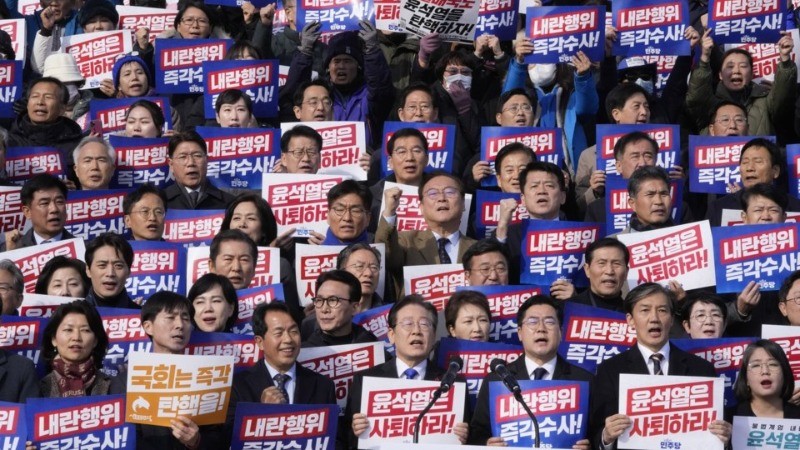
South Korean President Yoon Suk Yeol's sudden declaration of martial law on Tuesday night was swiftly reversed, leading to major political turmoil and putting his leadership at risk. Yoon declared martial law at 11 p.m. in a bid to counter what he described as "anti-state forces" threatening South Korea's constitutional order. However, just two hours later, an emergency session of parliament unanimously rebuked his move, and within six hours, the martial law order was lifted.
The brief yet dramatic shift from military control back to civilian governance marks one of the most significant political crises South Korea has faced since transitioning to democracy in 1987. This unexpected move, coming amid mounting political isolation for Yoon, has raised the possibility of impeachment and put his presidency in jeopardy.
What Happened During the Martial Law Period?
When martial law was imposed, the military took control of the country’s security, freezing laws and granting the army sweeping powers to detain people and censor the media. Despite these extraordinary powers, there were no reports of military overreach, though protests erupted as citizens gathered to express their opposition outside parliament. Tensions rose as military forces blocked access to the building.
Yoon later justified his decision, claiming the declaration was necessary to safeguard the country against what he called "North Korean communist forces" and alleged attempts to destabilize the government. However, he did not provide specific evidence of any North Korean military movements.
Political Isolation and Domestic Struggles
Yoon's decision appeared to stem from his domestic political isolation, particularly from the opposition-led parliament, which has held control for the past two years. His approval ratings have been declining, and he faced criticism for not addressing calls for independent investigations into financial scandals involving his administration. Yoon's frustration was evident as he accused the opposition of undermining his ability to govern, citing their actions such as slashing his national budget by $700 billion and proposing multiple impeachment motions against him.
Despite this, no one expected such a drastic response from the president.
Resignation Demands and Impeachment Threat
The political fallout from the martial law declaration was swift. South Korea's Defense Minister Kim Yong Hyun resigned, apologizing for causing confusion and concern. Meanwhile, opposition parties quickly called for Yoon’s resignation or impeachment. They submitted a bill to parliament to impeach the president, with a vote expected in the coming days.
The Democratic Party argued that Yoon's actions demonstrated that he could no longer effectively govern the country. If the impeachment bill passes, it would require a two-thirds majority in parliament to remove Yoon from office. The constitutional court would then decide whether to approve the impeachment.
Impact on South Korea’s Economy
The political chaos took a toll on South Korea’s economy. Stocks fell by 1.4% following the declaration of martial law, and the won remained near a two-year low against the dollar. Protests, along with a nationwide strike organized by the Korean Confederation of Trade Unions, are expected to continue. The U.S. Embassy in Seoul issued warnings to American nationals, urging them to avoid protest areas.
International Reactions
The White House expressed relief that Yoon had reversed the martial law order, with a spokesperson emphasizing the importance of democracy in the U.S.-South Korea relationship. Analysts have warned that the situation could damage South Korea's standing as a stable democracy in the region, especially as tensions with North Korea and China continue to rise.
Looking Ahead
As South Korea faces political and economic uncertainty, it remains to be seen whether Yoon can weather the storm or if his presidency will come to an abrupt end. With the opposition gaining momentum, impeachment seems increasingly likely, marking a critical moment in the nation's democratic journey.